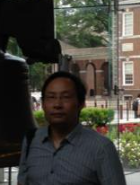Suppose An Ant Has A Weapon Poem by floresence georgeao
Suppose An Ant Has A Weapon
If an ant possessed a weapon,
Would it first shoot at the pangolin?
Shoot at the elephant?
Would it enjoy the game of coronation?
Would the forest need to rearrange its hierarchy?
If a black ant possessed a weapon,
Would it shoot at the white ant?
Shoot at the winged ant learning to fly?
Shoot at the ants that are happy?
If an ant did not shoot,
Is it only because it has no weapon?
If an ant has no weapon,
Is it always just an ant?
If an ant also possessed nuclear weapons,
Would the Earth be destroyed?
This poem raises profound questions about power, hierarchy, and the inherent nature of beings, using the metaphor of an ant with a weapon. Here's an exploration of its themes and implications:
Power and Hierarchy:
The poem starts by questioning what an ant would do if it possessed a weapon, drawing a parallel to how creatures or people might behave when given power. The specific mention of the pangolin and the elephant suggests the consideration of targets of different sizes and strengths, implying the dynamics of power and how it might be used against different adversaries.
Equality and Discrimination:
The second stanza addresses internal discrimination within the ant community, questioning if a black ant would shoot at a white ant or a winged ant. This touches on themes of racial discrimination, jealousy, and the potential for internal conflict within a group.
Nature of Violence:
The poem then questions if the lack of violence from ants is simply because they lack weapons, suggesting that the propensity for violence might be universal if the means are available. It challenges the reader to consider if peace is a choice or merely a circumstance.
Existence and Identity:
The lines about an ant without a weapon question whether the essence of being an ant is tied to its lack of a weapon, or if having a weapon would fundamentally change what it means to be an ant. This can be extended to a broader philosophical inquiry about how tools and power alter identity and nature.
Destruction and Responsibility:
The final stanza escalates the scenario to ants possessing nuclear weapons, directly linking the idea of power with the potential for global destruction. It's a stark reminder of the catastrophic potential of human conflict and the weapons we possess.
Human Parallel:
While the poem talks about ants, it clearly serves as a metaphor for human society. The behavior of ants with weapons is a mirror to human behavior with power, questioning our ethics, the reasons behind our violence, and the potential consequences of our actions.
Overall, the poem is a contemplative piece that uses the simple metaphor of an ant to delve into complex issues of power, violence, discrimination, and existential identity. It invites readers to reflect on how power and weapons change behavior and the intrinsic nature of beings, and by extension, to think critically about the human condition and our own use of power.
假如一只蚂蚁拥有了武器
它会不会首先向穿山甲射击
向大象射击
它会不会喜欢上加冕的游戏
森林是不是要重新编排座次
假如一只黑蚂蚁拥有了武器
它会不会向白蚂蚁射击
向学习飞行的有翼蚂蚁射击
向拥有幸福的蚂蚁射击
假如一只蚂蚁没有射击
是否只因没有武器
假如一只蚂蚁没有武器
是否永远是只蚂蚁
假如一只蚂蚁也拥有了核武
地球是否会毁灭
This poem has not been translated into any other language yet.
I would like to translate this poem